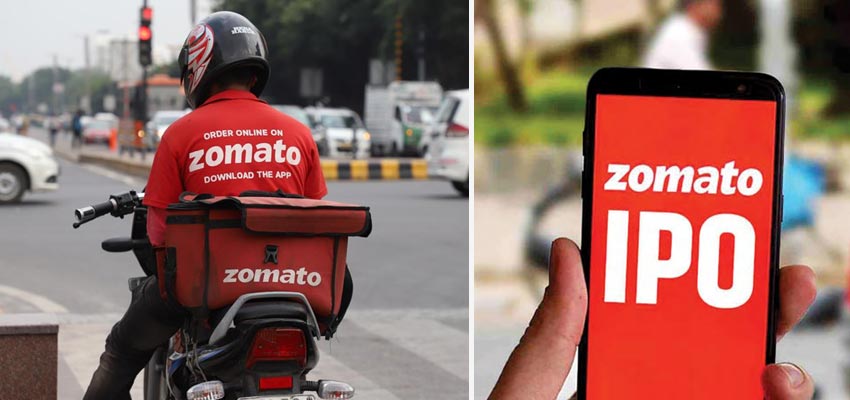The Zomato Zing!

With the recent opening of food delivery platform Zomato’s IPO, which is the first Internet unicorn to list in India, there is a buzz of startup IPOs in the market. The Covid pandemic has in a way provided an opportunity to the startup ecosystem in India, to firm up their plans for a public listing in India. Will IPOs drive India’s startup revolution in the coming years? Corporate leaders reflected on this question and much more on the recent IPO buzz and what does the future hold for startups going public
"The Zomato IPO is indeed a significant positive development in India’s startup environment’s evolution"
- Ajay Bagga

Has the Covid pandemic provided an opportunity to the startup ecosystem in India, to firm up their plans for a public listing in India? On the backdrop of Zomato IPO opening, opinions by experts generally portray a bright picture of the public investors who are emboldened enough to take risks.
States Ajay Bagga, former top banker and financial analyst, "The Zomato IPO is indeed a significant positive development in India’s startup environment’s evolution. For the first time, a company of this scale and size has been listed in the public space. This will provide a lot of confidence to VC/PE funds to deepen their exposure to the Indian startup ecosystem. However, the primary source of funding to startups will remain VC/PE funds, with the public markets listing providing a profitable exit route. That demonstrative effect of the Zomato IPO and the proposed Paytm IPO is very important. It marks the maturing of the Indian public markets to take on this level of scale and risk. The ability of the Indian investors to absorb an issue of this size is a good portent for the future of public markets in India."
States Debashis Basu, leading financial journalist and co-founder of the popular Moneylife e-news magazine, "Startups have been thriving for the past decade or so. While all know the success of Flipkart and Paytm, dozens of Indian tech startups are now classified as Unicorns or those valued at more than a billion dollars. India is a hot market for private equity investors. What Zomato has done is to establish that even public shareholders have an appetite for such fast growing but loss-making companies."
According to Anil Lamba, a leading financial consultant and trainer, "The news of Zomato going public, the first consumer internet startup to do so, was received with a mixed bag of scepticism and optimism. Eventually, however, the sceptics were proved wrong. At an offer price of Rs.76, the issue garnered Rs.2 lakh crores as against issue size of Rs.9000 plus crores. It then made a spectacular debut on Dalal Street, opening at Rs.116, over 52 per cent premium to its offer price."
"Despite a cumulative loss of Rs.3500 crores in the previous two financial years, the stock has a total market cap of an unbelievable Rs.60,000 crores"-prompting the following tweet from Harsh Goenka:
“Top 20 hotels including global Indian hotel brands - total market cap 44,000 cr Top 6 QSR chains serving millions of consumers - 60,000 cr ZOMATO - Continuing huge losses. Hold my vadapav! Market cap - 60,000 cr?”
"Covid has nothing to do with the public listing. The rush of IPOs has to do with a very favourable market condition"
- Debashis Basu

States Dr Suresh Srinivasan, Distinguished Professor of Strategy & Accounting, Great Lakes Institute of Management, Chennai, “The Zomato story of a successful listing is bound to vitalise the startup revolution in coming years, if not months. With favourable listing beyond the valuations tendered, the markets have vouched for the Zomato potential purely from the perspective of its business model and the customer problem it is solving using technology. Such confidence which Zomato story brings to the market has much to do with the ‘Startup India’ initiative, Atal innovation mission & incubation centres; international patent protection regime in electronics and information technology, tax-free regime for startups; simpler exit procedures and extending hassle-free bank finance to first-generation entrepreneurs under the credit guarantee fund trust will all increase the startups that could scale and many of which can now ‘dream’ to list at the earliest opportunity.’’
However, Basu debunks the question of whether Covid pandemic has provided an opportunity to the startup ecosystem in India, to firm up their plans for a public listing in India? He states, “Covid has nothing to do with the public listing. The rush of IPOs has to do with a very favourable market condition. In a bull market, people are more receptive to new investment ideas, having made money in other scrips. The rush of POs has to do with a very favourable market condition. In a bullish market, people are more receptive to new investment ideas, having made money in other scrips.”
Dr Srinivasan too analyses the difference between new generation and old generation companies in their approach to going for public listing. Says he, “Valuing a startup is an altogether different ball game in comparison to valuing a company with a proven business model having established maintainable earnings and profits. That’s why traditional companies take a longer horizon to go public and list themselves in the market. Such companies with great caution choose the timing to go public considering various aspects like reaching a stabilised operation with a steady stream of growing profits, with a proven leadership in place with sufficient maturity and a governance structure that is acceptable. Given the information asymmetry between the managers running the company and the potential investors, these aspects become vital to signal a credible valuation.
“Startups do not have any of the credentials such established companies offer in terms of cash flows and profits to justify their valuations; to the contrary, startups are in most situations loss-making and burn cash. Valuations of startups are merely based on the perception of a small group of early-stage investors, like private equity players and venture capitalists who view the startup from the perspective of the people behind it, their passion, the business model and the potential it has to disrupt the market; such valuations are sometimes also questioned.
"The Zomato story of a successful listing is bound to vitalise the startup revolution in coming years, if not months"
- Dr Suresh Srinivasan

However, the optimism and the colossal interest in this IPO has been mind-boggling, says Bagga too with equal optimism, “There will be an acceleration in both the private space funding of Indian startups and in the rapid listing of startups to enable further growth capital to be raised as well as to provide a profitable exit to the original venture fund investors. The scepticism was whether this profitless prosperity model of listing unprofitable startups would gain traction in India. The Zomato IPOs massive over subscription and the post listing appreciation has provided a good highway that can be used by other Indian startups as well.’’
The pandemic has boosted the digital disruption in the economy and created huge opportunities for technology platforms to innovate and grab business from established players. We have seen this across fintech, healthtech, edutech, insuretech as well as communications.
Will it provide a further boost to other startups? Yes, says Lamba, “This is extremely good news for the other startups waiting in the wings to launch their own IPOs and will provide a boost of confidence to the likes of Policy Bazaar, CRED, Nykaa and Mobikwik. At over 9,000 crores, Zomato’s was one of the largest IPOs in recent years. However, it could pale in comparison to the size of the impending IPO announcement of Paytm, of a whopping 16,000 crore, the biggest among the new economy companies and third-biggest overall after Coal India and Reliance Power.
The pandemic, which triggered misery among many sectors like hospitality, airlines, travel and tourism, turned out to be a boon for tech startups, with people increasingly switching to digital solutions.’’
"The pandemic, which triggered misery among many sectors like hospitality, airlines, travel and tourism, turned out to be a boon for tech startups"
- Anil Lamba

Adds Bagga, “Moreover, the number of online investors in India who are willing to invest in the stock markets has increased substantially during the pandemic, in line with global trends. These investors represent a large pool of risk capital that has acquired a significant size globally and in India. This provides another pool of liquidity for the Indian markets and will deepen and broaden the investment horizons in India. The strategic sale of Flipkart and now the Zomato IPO have demonstrated the depth and success of the Indian startup ecosystem to scale up disruptive business models into unicorns and more.
“The next logical development is the entry of these privately funded companies into the public markets. This is very welcome as unlike earlier times where the value went to foreign capital providers and the listings would be done in foreign markets, this time the value has been offered to Indian investors with an Indian public market listing. The successful listing of Zomato has paved the way for many more such listings and the day is not far when the regulator will look at allowing innovative structures like Special Purpose Acquisition Corporations (SPACs) which have provided huge opportunities for listing public companies in the US markets.
“We see this trend continuing with many large scale IPOs like Paytm, Nykaa and Delhivery on the anvil. This will provide an opportunity to Indian investors to participate in the monetisation of the Indian consumption opportunity.”
Concludes Srinivasan, “While 2020 could have been a poor year for the industry, but not for startups; India added more than 1,500 technology startups making it the third-largest technology startup community in the world. The first half of 2021 has already surpassed the startup funding achieved during 2020 demonstrating the vibrance of the startup ecosystem in the country. The pandemic has brought in substantial changes to consumer behaviour and those startups with business models that meet such consumer needs have soared up in valuations across sectors; Unacademy and Eruditus in the learning space, BharatPe, Razor Pay and Pinelabs in the fintech space, Practo, PharmEasy and CureFit in the healthcare and lifestyle space. Given the impetus provided by Zomato’s success and with the encouraging regulations many more startups are already looking for listing in the Indian bourses.’’